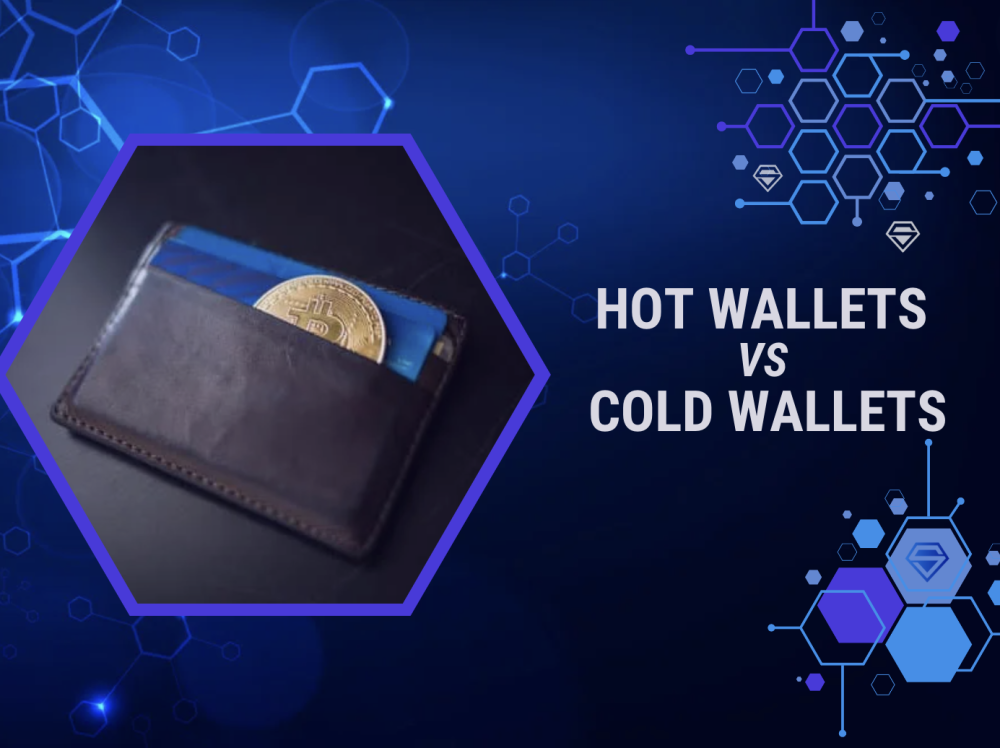
12. July, 2024
Hot Wallets vs Cold Wallets: Key Differences
Cryptocurrency trading is a fast-paced gamble and every second counts. As a trader, you need quick access to your funds to seize opportunities in the market. But what about those long-term holdings you’re not actively trading? That’s where the debate between hot and cold wallets heats up.
Each type offers distinct advantages, and knowing how cryptocurrency hot wallets differ from cold wallets helps you create a storage strategy that aligns with your trading style and long-term goals.
Find out the differences between these two wallet types so you know how to optimize your trading agility and the security of your crypto assets.
What Are Hot Wallets?
Hot wallets are your digital companions, always connected to the internet and ready for action. These wallets come in different forms:
- Web Wallets: Accessible through your web browser, these wallets offer convenience for quick transactions and checking your balances on any device.
- Mobile Wallets: Designed for smartphones, these apps let you manage your crypto on the move, perfect for making payments or trading while you’re out and about.
- Exchange Wallets: Built into cryptocurrency exchanges, these wallets streamline buying, selling, and trading directly on the platform.
Accessibility
The defining feature of hot wallets is their constant internet connection. This makes them incredibly convenient for active traders who need quick access to their funds. Unlike cold wallets, which we’ll discuss later, hot wallets allow you to:
- Send and receive crypto instantly.
- Easily check your balances and transaction history.
- Quickly execute trades on exchanges.
User-Friendly and Feature-Rich
Hot wallets often feature intuitive interfaces that make them easy for beginners to navigate. Many hot wallets also offer additional features, such as:
- Integration with decentralized applications (DApps)
- Staking capabilities to earn rewards
- Portfolio tracking and analysis tools
Security Considerations
The convenience of hot wallets comes with a trade-off: heightened security risks. Because they’re always online, hot wallets are more vulnerable to hacking attempts and malware.
While most reputable wallet providers implement security measures like two-factor authentication and encryption, it’s important to be aware of the potential risks.
What Are Cold Wallets?
While hot wallets have good accessibility, cold wallets have better security. Unlike their always-online counterparts, cold wallets function entirely offline. They exist as physical devices or printed materials. This offline status shields them from hacking and malware, common threats to hot wallets.
Here are the types of cold wallets:
Hardware Wallets
Resembling USB drives, these wallets store your private keys on a secure chip. To authorize a transaction, connect the device to your computer or smartphone. Your keys never leave the device, ensuring maximum protection.
Paper Wallets
A simple yet effective method, paper wallets involve printing your public and private keys onto paper. While straightforward, this method demands careful protection of the physical document to prevent loss or damage.
Offline Software Wallets
Think of these as software wallets installed on a computer that has never touched the internet (an “air-gapped” device). This ensures your keys are generated and stored in a completely offline environment.
Maximum Security, Minimal Risk
For traders holding substantial amounts of cryptocurrency or prioritizing long-term security, cold wallets are the preferred choice. Since your private keys never encounter the internet, they remain beyond the reach of hackers. This level of protection is unmatched by hot wallets. Cold wallets are ideal for:
- Hodling: Securely storing large amounts of cryptocurrency for extended periods.
- Protection Against Hacks: Safeguarding your assets from online threats.
- Maintaining Full Control: You retain complete control over your private keys, eliminating third-party vulnerabilities.
Trade-offs
Enhanced security comes with trade-offs. Cold wallets aren’t as convenient as hot wallets for frequent trading. You need to physically connect the device or access your paper wallet for transactions.
Also, the responsibility for safeguarding your cold wallet rests solely on you. Losing your hardware wallet or damaging your paper wallet could result in the permanent loss of your funds.
Hot vs. Cold Wallets: Which is Better?
Now, let’s compare hot and cold wallets to answer the burning question for traders: how are cryptocurrency hot wallets different from cold wallets?
| Feature | Hot Wallets | Cold Wallets |
| Security | Vulnerable to online threats like hacking and malware. | Immune to online threats due to offline storage. |
| Accessibility | Easily accessible via the internet from any device. | Requires physical access to the device or paper wallet. |
| Convenience | Ideal for frequent transactions and quick access to funds. | Less convenient for regular trading. |
| Cost | Free or low cost | Can be expensive, especially for hardware wallets. |
| Best Use Cases | Frequent trading, small amounts, everyday spending. | Long-term storage, large holdings, maximum security. |
Traders, this table provides a clear snapshot of the differences. Hot wallets win in convenience and accessibility, perfect for those who actively trade or use crypto for daily transactions. However, their online nature poses security risks.
Cold wallets prioritize security above all else. By keeping your private keys offline, they offer strong protection against hackers. This makes them ideal for storing large amounts of cryptocurrency that you don’t need to access regularly.
While hot wallets might be your go-to for daily trading, consider a cold wallet to store the bulk of your holdings for long-term security.
Factors to Consider Before Choosing Your Crypto Wallet
Choosing the right crypto wallet is a personal decision. It depends on your individual needs and priorities as a trader. Let’s break down the factors to consider:
1. How Much Crypto Do You Hold?
If you’re just starting and only hold a small amount, a hot wallet might be sufficient. However, as your portfolio grows, a cold wallet becomes increasingly important for enhanced security.
Think of it like this: you wouldn’t leave a large amount of cash lying around in your house, so why risk your valuable crypto assets in a less secure environment?
2. How Often Do You Trade?
Are you an active trader who makes daily or weekly transactions? If so, a hot wallet’s accessibility and convenience are hard to beat. But if you’re more of a long-term investor who rarely trades, a cold wallet’s security becomes paramount.
After all, your priority is safeguarding your assets over the long haul, not quick access for frequent trades.
3. How Concerned Are You About Security?
If you’re constantly worried about hacking attempts and cyberattacks, a cold wallet is the most secure. Its offline nature makes it virtually impenetrable to online threats. While hot wallets have security measures in place, they are inherently more vulnerable due to their internet connection.
4. How Tech-Savvy Are You?
Hot wallets often boast user-friendly interfaces, making them ideal for beginners. However, some cold wallets, especially hardware wallets, may require a bit more technical know-how to set up and use.
If you’re not confident in your technical skills, a hot wallet or a simpler cold wallet option might be a better choice.
You Can Combine Hot and Cold Wallets
Ultimately, the best crypto wallet is the one that best aligns with your priorities. There’s no shame in using a combination of both hot and cold wallets. Many traders do just that, using hot wallets for active trading and cold wallets for securing the bulk of their holdings.
Which Wallet Matches Your Crypto Strategy?
So, how are cryptocurrency hot wallets different from cold wallets? Hot and cold wallets each have their strengths and weaknesses. For many traders, the best approach is to use both. Keep a small amount in a hot wallet for trading, and secure the rest in a cold wallet for the long term. It’s up to you to choose the right tools and strategies to safeguard your digital assets.


